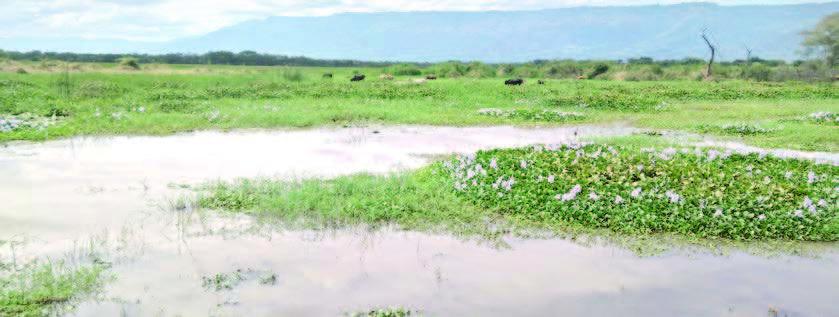Why the world may soon ‘forget’ Kenya’s Lake Kamnarok
Increased human activities and water hyacinth choking life out of Africa's second largest crocodiles home

By Dan Kaburu for People Daily in Kenya
Kenya’s Rift Valley, the cradle of mankind, is known for its many lakes. The lakes are tourist attraction sites earning regional counties millions of pounds in revenue. But one such facility, Lake Kamnarok Game Reserve in the Kerio Valley 140 miles northwest of the capital, Nairobi, could soon be extinct if nothing is done to save it.
The lake and reserve was once home to more than 10,000 crocodiles, the second highest population in Africa after Lake Chad, 400 elephants, 13 species of other mammals. Now it is a shadow of its former self.
Rampant human activities such as wanton felling of trees for charcoal burning and farming as well as invasion of water hyacinth are posing a major threat to the reserve. The number of crocodiles has reduced to below 3,000 with the situation getting worse every day.
At the shores of the lake you will be forgiven to think it’s a farm, because of the water hyacinth and other types of vegetation that have covered it over time. Lake Kamnarok is located at the base of Elgeyo Marakwet escapement.
This reporter’s mission to catch a glimpse of the rare crocodile species was not easy. It was a whole day walk in vain. The ecosystem also used to hosts 59 birds species but today most of them have migrated to other areas. The park hosts 600 elephants, with more than 20,000 people and more than 500,000 heads of cattle depending on it.
Due to the drying-up of the lake, human-wildlife conflicts have increased. When we visited, a Kenya Wildlife Service ranger was being buried at a nearby village after he was trampled on by an elephant while preventing them from accessing the village.
The death of the lake is occasioned by poor land use, uncontrolled charcoal burning and other human activities in the upper areas of the lake which has led to siltation.
There are fears that the situation could get worse because of the nearby construction of a new road linking Ainamoi Barwesa to Koloa. The loose soil from the construction finds its way to the lake when it rains.
Baringo Governor Stanley Kiptis admits that the lake is on its deathbed and urges stakeholders to partner with the county government to save it. “The lake was once a tourist attraction site but today no tourists visit,” he said.
The county government has also embarked on reviving the lost glory of the lake with the devolved unit setting aside Sh1 .2 million in a pilot project aimed at removing the invasive water hyacinth from the lake.

This article is reproduced here as part of the Giants Club African Conservation Journalism Fellowships, a programme of the charity Space for Giants and supported by the owner of ESI Media, which includes independent.co.uk. It aims to expand the reach of conservation and environmental journalism in Africa, and bring more African voices into the international conservation debate. Read the original story here
Join our commenting forum
Join thought-provoking conversations, follow other Independent readers and see their replies
Comments
Bookmark popover
Removed from bookmarks